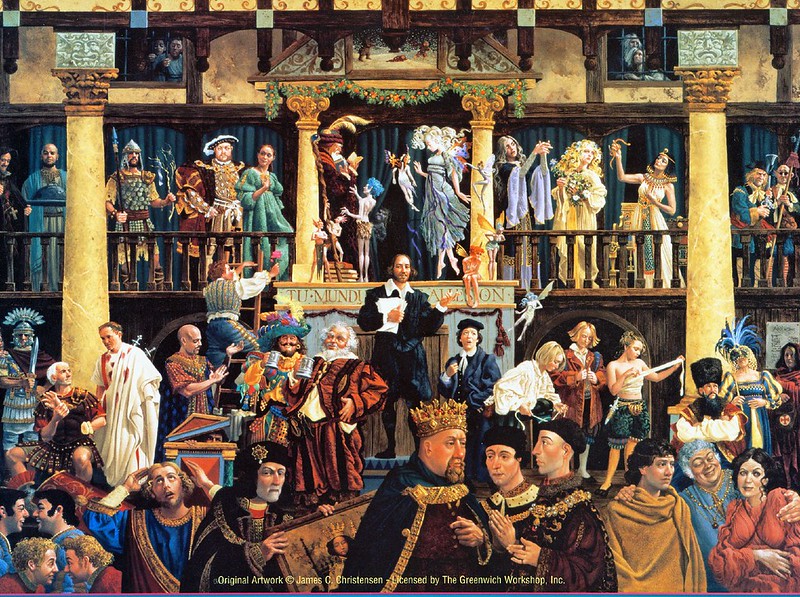20 Hilarious Shakespeare Monologues For Men
1. A Midsummer Night’s Dream

https://creativecommons.org/licenses/by/2.0,
via Wikimedia Commons
Act 3, Scene 2
PUCK
My mistress with a monster is in love.
Near to her close and consecrated bower,
While she was in her dull and sleeping hour,
A crew of patches, rude mechanicals,
That work for bread upon Athenian stalls,
Were met together to rehearse a play,
Intended for great Theseus’ nuptial day.
The shallowest thickskin of that barren sort,
Who Pyramus presented in their sport,
Forsook his scene and entered in a brake.
When I did him at this advantage take,
An ass’s nole I fixèd on his head.
Anon his Thisby must be answerèd,
And forth my mimic comes. When they him spy,
As wild geese that the creeping fowler eye,
Or russet-pated choughs, many in sort,
Rising and cawing at the gun’s report,
Sever themselves and madly sweep the sky;
So at his sight away his fellows fly,
And at our stamp here o’er and o’er one falls;
He murder cries and help from Athens calls.
Their sense thus weak, lost with their fears thus strong,
Made senseless things begin to do them wrong,
For briers and thorns at their apparel snatch:
Some, sleeves — some, hats; from yielders all things catch.
I led them on in this distracted fear
And left sweet Pyramus translated there,
When in that moment (so it came to pass)
Titania waked, and straightway loved an ass.
2. Two Gentlemen Of Verona
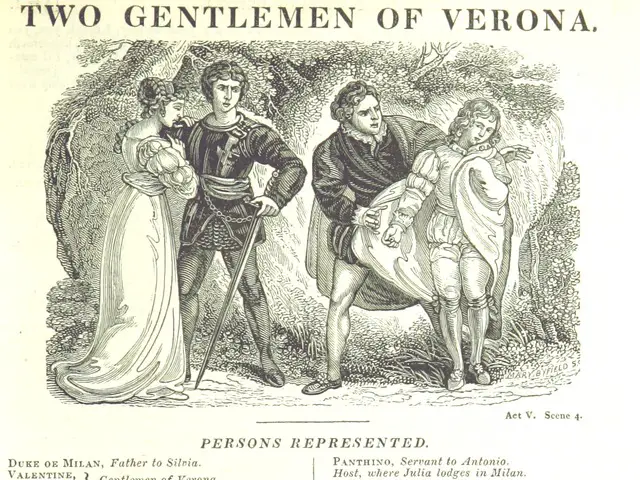
Act 2, Scene 3
LAUNCE
Nay, ’twill be this hour ere I have done weeping. All the kind of the Launces have this very fault. I have received my proportion, like the prodigious son, and am going with Sir Proteus to the Imperial’s court.
I think Crab, my dog, be the sourest-natured dog that lives. My mother weeping, my father wailing, my sister crying, our maid howling, our cat wringing her hands, and all our house in a great perplexity, yet did not this cruel-hearted cur shed one tear.
He is a stone, a very pebble stone, and has no more pity in him than a dog. A Jew would have wept to have seen our parting. Why, my grandam, having no eyes, look you, wept herself blind at my parting.
Nay, I’ll show you the manner of it. This shoe is my father. No, this left shoe is my father. No, no, this left shoe is my mother. Nay, that cannot be so neither.
Yes, it is so, it is so — it hath the worser sole. This shoe with the hole in it is my mother, and this my father. A vengeance on’t! There ’tis.
Now, sir, this staff is my sister, for, look you, she is as white as a lily and as small as a wand. This hat is Nan, our maid. I am the dog. No, the dog is himself, and I am the dog — O, the dog is me, and I am myself.
Ay, so, so. Now come I to my father: ‘Father, your blessing.’ Now should not the shoe speak a word for weeping. Now should I kiss my father — well, he weeps on.
Now come I to my mother. O, that she could speak now like a wood woman! Well, I kiss her — why, there ’tis: here’s my mother’s breath up and down. Now come I to my sister; mark the moan she makes. Now the dog all this while sheds not a tear nor speaks a word!
3. Comedy Of Errors
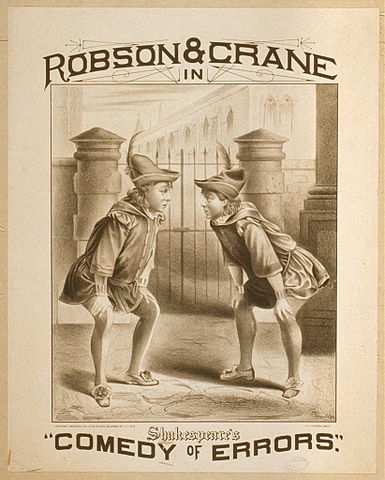
Act 2, Scene 1
Dromio of Ephesus
I mean not cuckold-mad;
But, sure, he is stark mad.
When I desired him to come home to dinner,
He ask’d me for a thousand marks in gold:
”Tis dinner-time,’ quoth I; ‘My gold!’ quoth he;
‘Your meat doth burn,’ quoth I; ‘My gold!’ quoth he:
‘Will you come home?’ quoth I; ‘My gold!’ quoth he.
‘Where is the thousand marks I gave thee, villain?’
‘The pig,’ quoth I, ‘is burn’d;’ ‘My gold!’ quoth he:
‘My mistress, sir’ quoth I; ‘Hang up thy mistress!
I know not thy mistress; out on thy mistress!’
Quoth my master:
‘I know,’ quoth he, ‘no house, no wife, no mistress.’
So that my errand, due unto my tongue,
I thank him, I bare home upon my shoulders;
For, in conclusion, he did beat me there.
4. Love’s Labour’s Lost
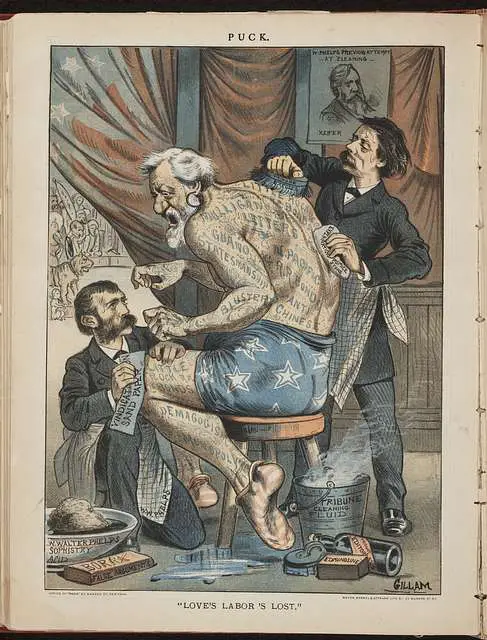
Act 3, Scene 1
Berowne
“And I, forsooth, in love!
I, that have been love’s whip,
A very beadle to a humorous sigh,
A critic, nay, a night-watch constable,
A domineering pedant o’er the boy,
Than whom no mortal so magnificent.
This wimpled, whining, purblind, wayward boy,
This signor-junior, giant-dwarf, Dan Cupid,
Regent of love-rimes, lord of folded arms,
The anointed sovereign of sighs and groans,
Liege of all loiterers and malcontents,
Dread prince of plackets, king of codpieces,
Sole imperator and great general
Of trotting paritors — O my little heart!
And I to be a corporal of his field,
And wear his colors like a tumbler’s hoop!
What? I love, I sue, I seek a wife!
A woman that is like a German clock,
Still a-repairing, ever out of frame,
And never going aright, being a watch,
But being watched that it may still go right!
Nay, to be perjured, which is worst of all;
And, among three, to love the worst of all;
A whitely wanton with a velvet brow,
With two pitch balls stuck in her face for eyes.
Ay, and, by heaven, one that will do the deed,
Though Argus were her eunuch and her guard.
And I to sigh for her, to watch for her,
To pray for her! Go to, it is a plague
That Cupid will impose for my neglect
Of his almighty dreadful little might.
Well, I will love, write, sigh, pray, sue, groan:
Some men must love my lady, and some Joan.”
5. A Midsummer Night’s Dream
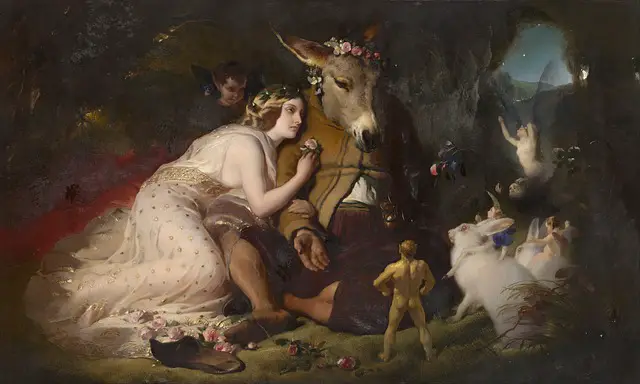
Act 4, Scene 1
Bottom
[Awaking] When my cue comes, call me, and I will
answer: my next is, ‘Most fair Pyramus.’ Heigh-ho!
Peter Quince! Flute, the bellows-mender! Snout,
the tinker! Starveling! God’s my life, stolen
hence, and left me asleep! I have had a most rare
vision. I have had a dream, past the wit of man to
say what dream it was: man is but an ass, if he go
about to expound this dream. Methought I was–there
is no man can tell what. Methought I was,–and
methought I had,–but man is but a patched fool, if
he will offer to say what methought I had. The eye
of man hath not heard, the ear of man hath not
seen, man’s hand is not able to taste, his tongue
to conceive, nor his heart to report, what my dream
was. I will get Peter Quince to write a ballad of
this dream: it shall be called Bottom’s Dream,
because it hath no bottom; and I will sing it in the
latter end of a play, before the duke:
peradventure, to make it the more gracious,
I shall sing it at her death.
6. Twelfth Night

Act 1, Scene 1
Orsino
“If music be the food of love, play on; Give me excess of it, that, surfeiting, The appetite may sicken, and so die. That strain again! it had a dying fall: O, it came o’er my ear like the sweet sound, That breathes upon a bank of violets, Stealing and giving odour! Enough; no more: ‘Tis not so sweet now as it was before. O spirit of love! how quick and fresh art thou, That, notwithstanding thy capacity Receiveth as the sea, nought enters there, Of what validity and pitch soe’er, But falls into abatement and low price, Even in a minute: so full of shapes is fancy That it alone is high fantastical.”
7. Measure For Measure
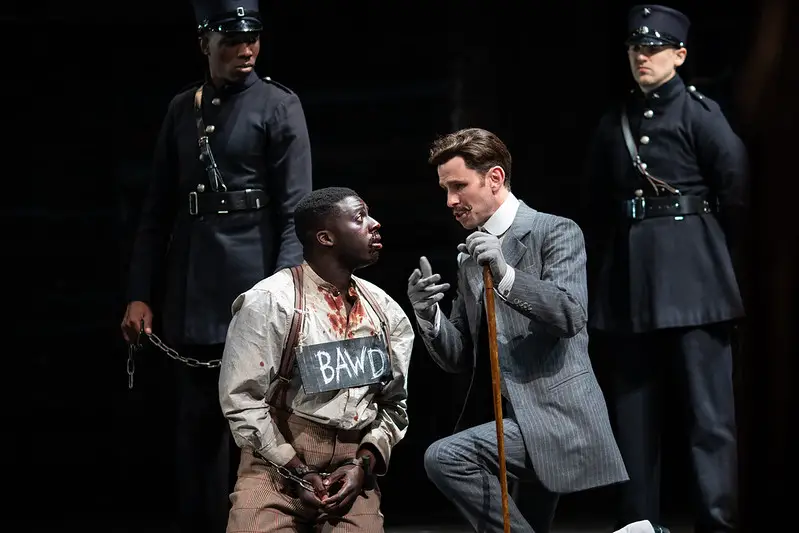
Act 3, Scene 1
Claudio
Ay, but to die, and go we know not where;
To lie in cold obstruction and to rot;
This sensible warm motion to become
A kneaded clod; and the delighted spirit
To bathe in fiery floods, or to reside
In thrilling region of thick-ribbed ice;
To be imprison’d in the viewless winds,
And blown with restless violence round about
The pendent world; or to be worse than worst
Of those that lawless and incertain thought
Imagine howling: ’tis too horrible!
The weariest and most loathed worldly life
That age, ache, penury and imprisonment
Can lay on nature is a paradise
To what we fear of death.
8. The Merry Wives Of Windsor

Act 1, Scene 3
Falstaff
O, she did so course o’er my exteriors with such a
greedy intention, that the appetite of her eye did
seem to scorch me up like a burning-glass! Here’s
another letter to her: she bears the purse too; she
is a region in Guiana, all gold and bounty. I will
be cheater to them both, and they shall be
exchequers to me; they shall be my East and West
Indies, and I will trade to them both. Go bear thou
this letter to Mistress Page; and thou this to
Mistress Ford: we will thrive, lads, we will thrive.
9. Taming Of The Shrew

https://creativecommons.org/licenses/by/2.0, via Wikimedia Commons
Induction/Prologue – 1, 45
Lord
Even as a flattering dream or worthless fancy.
Then take him up and manage well the jest:
Carry him gently to my fairest chamber
And hang it round with all my wanton pictures:
Balm his foul head in warm distilled waters
And burn sweet wood to make the lodging sweet:
Procure me music ready when he wakes,
To make a dulcet and a heavenly sound;
And if he chance to speak, be ready straight
And with a low submissive reverence
Say ‘What is it your honour will command?’
Let one attend him with a silver basin
Full of rose-water and bestrew’d with flowers,
Another bear the ewer, the third a diaper,
And say ‘Will’t please your lordship cool your hands?’
Some one be ready with a costly suit
And ask him what apparel he will wear;
Another tell him of his hounds and horse,
And that his lady mourns at his disease:
Persuade him that he hath been lunatic;
And when he says he is, say that he dreams,
For he is nothing but a mighty lord.
This do and do it kindly, gentle sirs:
It will be pastime passing excellent,
If it be husbanded with modesty.
10. All’s Well That Ends Well
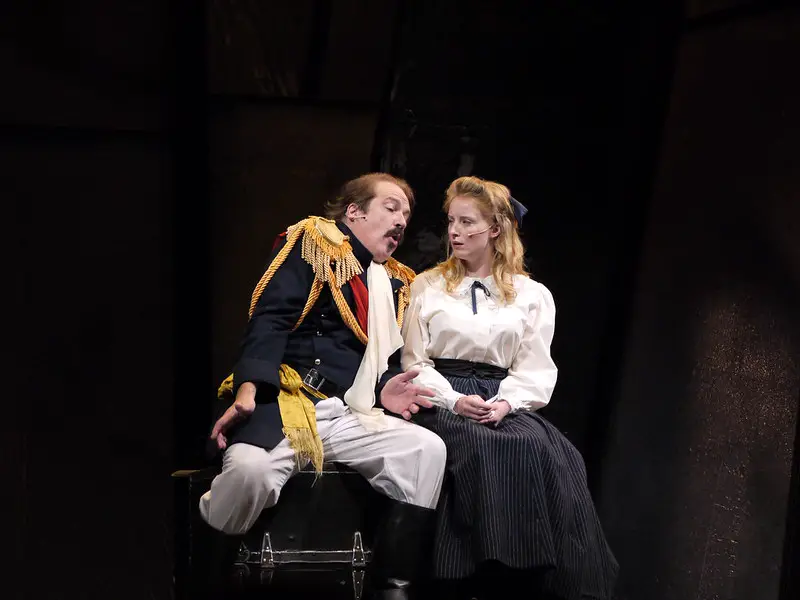
Act 1, Scene 1
PAROLLES
It is not politic in the commonwealth of nature to preserve virginity. Loss of virginity is rational increase, and there was never virgin got till virginity was first lost.
That you were made of is metal to make virgins. Virginity by being once lost may be ten times found; by being ever kept is ever lost. ‘Tis too cold a companion. Away with’t! ‘Tis against the rule of nature.
To speak on the part of virginity is to accuse your mothers, which is most infallible disobedience. He that hangs himself is a virgin; virginity murders itself, and should be buried in highways out of all sanctified limit, as a desperate offendress against nature.
Virginity breeds mites, much like a cheese, consumes itself to the very paring, and so dies with feeding his own stomach. Besides, virginity is peevish, proud, idle, made of self-love, which is the most inhibited sin in the canon.
Keep it not; you cannot choose but lose by’t. Out with’t! Within ten year it will make itself ten, which is a goodly increase, and the principal itself not much the worse. Away with’t!
‘Tis a commodity will lose the gloss with lying: the longer kept, the less worth. Off with’t while ’tis vendible; answer the time of request. Virginity, like an old courtier, wears her cap out of fashion, richly suited, but unsuitable, just like the brooch and the toothpick, which wear not now.
Your date is better in your pie and your porridge than in your cheek; and your virginity, your old virginity, is like one of our French withered pears: it looks ill, it eats drily. Marry, ’tis a withered pear; it was formerly better; marry, yet ’tis a withered pear! Will you anything with it?
11. Merchant Of Venice
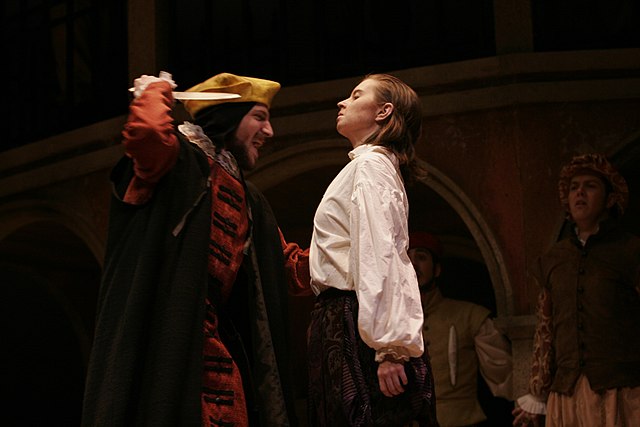
https://creativecommons.org/licenses/by-sa/2.0, via Wikimedia Commons
Act 2, Scene 2
Launcelot
Certainly my conscience will serve me to run from this Jew my master. The fiend is at mine elbow and tempts me saying to me ‘Gobbo, Launcelot Gobbo, good Launcelot,’ or ‘good Gobbo,’ or good Launcelot Gobbo, use your legs, take the start, run away.
My conscience says ‘No; take heed,’ honest Launcelot; take heed, honest Gobbo, or, as aforesaid, ‘honest Launcelot Gobbo; do not run; scorn running with thy heels.’
Well, the most courageous fiend bids me pack: ‘Via!’ says the fiend; ‘away!’ says the fiend; ‘for the heavens, rouse up a brave mind,’ says the fiend, ‘and run.’
Well, my conscience, hanging about the neck of my heart, says very wisely to me ‘My honest friend Launcelot, being an honest man’s son,’ or rather an honest woman’s son; for, indeed, my father did something smack, something grow to, he had a kind of taste; well, my conscience says ‘Launcelot, budge not.’
‘Budge,’ says the fiend. ‘Budge not,’ says my conscience. ‘Conscience,’ say I, ‘you counsel well;’ ‘ Fiend,’ say I, ‘you counsel well:’
to be ruled by my conscience, I should stay with the Jew my master, who, God bless the mark, is a kind of devil; and, to run away from the Jew, I should be ruled by the fiend, who, saving your reverence, is the devil himself.
Certainly the Jew is the very devil incarnal; and, in my conscience, my conscience is but a kind of hard conscience, to offer to counsel me to stay with the Jew.
The fiend gives the more friendly counsel: I will run, fiend; my heels are at your command; I will run.
12. Much Ado About Nothing
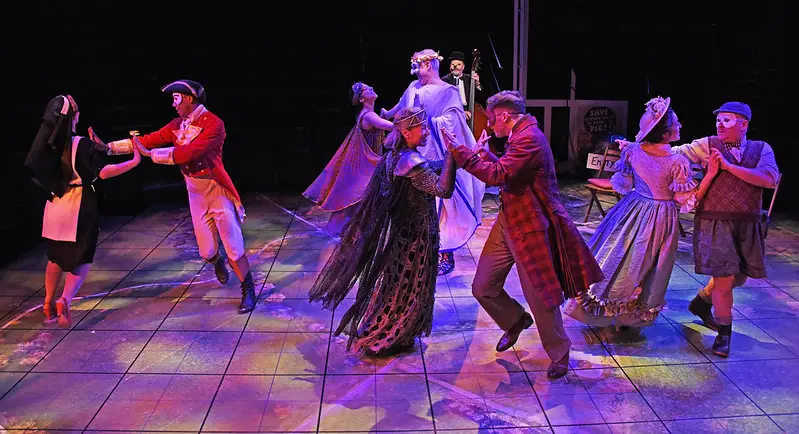
Act 2, Scene 1
BENEDICK
O, she misused me past the endurance of a block! An oak but with one green leaf on it would have answered her; my very visor began to assume life and scold with her.
She told me, not thinking I had been myself, that I was the Prince’s jester, that I was duller than a great thaw; huddling jest upon jest with such impossible conveyance upon me that I stood like a man at a mark, with a whole army shooting at me.
She speaks poniards, and every word stabs. If her breath were as terrible as her terminations, there were no living near her; she would infect the North Star.
I would not marry her though she were endowed with all that Adam had left him before he transgressed. She would have made Hercules have turned spit, yea, and have cleft his club to make the fire too. Come, talk not of her.
You shall find her the infernal Ate in good apparel. I would to God some scholar would conjure her, for certainly, while she is here, a man may live as quiet in hell as in a sanctuary; and people sin upon purpose, because they would go thither; so indeed all disquiet, horror, and perturbation follows her.
13. Macbeth
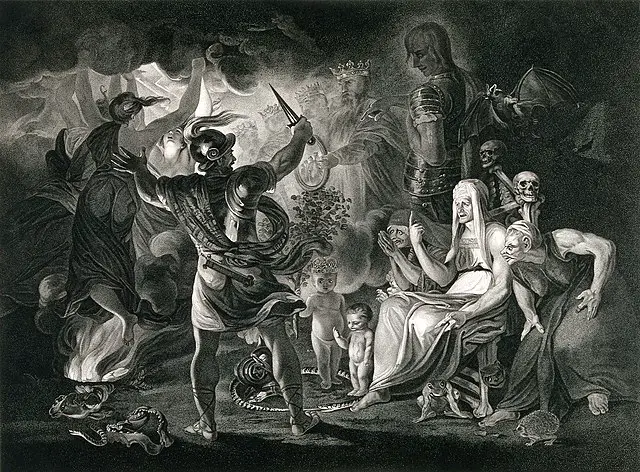
Act 2, Scene 3
Porter
Knocking within. Enter a Porter
Here’s a knocking indeed! If a
man were porter of hell-gate, he should have
old turning the key.
Knocking within
Knock,
knock, knock! Who’s there, i’ the name of
Beelzebub? Here’s a farmer, that hanged
himself on the expectation of plenty: come in
time; have napkins enow about you; here
you’ll sweat for’t.
Knocking within
Knock,
knock! Who’s there, in the other devil’s
name? Faith, here’s an equivocator, that could
swear in both the scales against either scale;
who committed treason enough for God’s sake,
yet could not equivocate to heaven: O, come
in, equivocator.
Knocking within
Knock,
knock, knock! Who’s there? Faith, here’s an
English tailor come hither, for stealing out of
a French hose: come in, tailor; here you may
roast your goose.
Knocking within
Knock,
knock; never at quiet! What are you? But
this place is too cold for hell. I’ll devil-porter
it no further: I had thought to have let in
some of all professions that go the primrose
way to the everlasting bonfire.
Knocking within
Anon, anon! I pray you, remember the porter.
Opens the gate
14. Comedy Of Errors
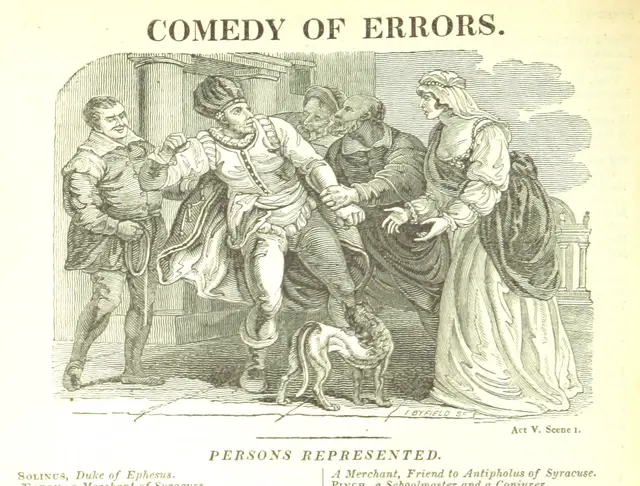
Act 3, Scene 2
Antipholus of Syracuse
Sweet mistress–what your name is else, I know not,
Nor by what wonder you do hit of mine,–
Less in your knowledge and your grace you show not
Than our earth’s wonder, more than earth divine.
Teach me, dear creature, how to think and speak;
Lay open to my earthy-gross conceit,
Smother’d in errors, feeble, shallow, weak,
The folded meaning of your words’ deceit.
Against my soul’s pure truth why labour you
To make it wander in an unknown field?
Are you a god? would you create me new?
Transform me then, and to your power I’ll yield.
But if that I am I, then well I know
Your weeping sister is no wife of mine,
Nor to her bed no homage do I owe
Far more, far more to you do I decline.
O, train me not, sweet mermaid, with thy note,
To drown me in thy sister’s flood of tears:
Sing, siren, for thyself and I will dote:
Spread o’er the silver waves thy golden hairs,
And as a bed I’ll take them and there lie,
And in that glorious supposition think
He gains by death that hath such means to die:
Let Love, being light, be drowned if she sink!
15. As You Like It

Act 1 Scene 1
Orlando
As I remember, Adam, it was upon this fashion bequeathed me by will but poor a thousand crowns, and, as thou sayest, charged my brother on his blessing, to breed me well: and there begins my sadness.
My brother Jaques he keeps at school, and report speaks goldenly of his profit: for my part, he keeps me rustically at home, or, to speak more properly, stays me here at home unkept; for call you that keeping for a gentleman of my birth, that differs not from the stalling of an ox?
His horses are bred better; for, besides that they are fair with their feeding, they are taught their manage, and to that end riders dearly hired: but I, his brother, gain nothing under him but growth, for the which his animals on his dunghills are as much bound to him as I.
Besides this nothing that he so plentifully gives me, the something that nature gave me, his countenance seems to take from me: he lets me feed with his hinds, bars me the place of a brother, and, as much as in him lies, mines my gentility with my education.
This is it, Adam, that grieves me; and the spirit of my father, which I think is within me, begins to mutiny against this servitude. I will no longer endure it, though yet I know no wise remedy how to avoid it.
Watch a performance of this monologue
16. The Tempest
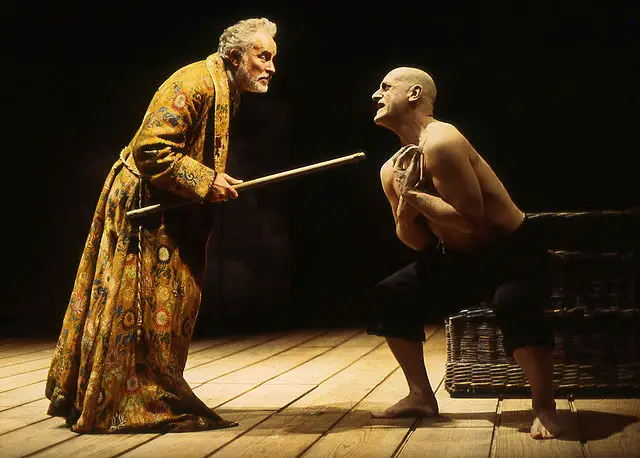
by-sa/4.0, via Wikimedia Commons
Act 4, Scene 1
Prospero
If I have too austerely punish’d you,
Your compensation makes amends, for
Have given you here a third of mine own life,
Or that for which I live; who once again
I tender to thy hand: all thy vexations
Were but my trials of thy love and thou
Hast strangely stood the test here, afore Heaven,
I ratify this my rich gift. O Ferdinand,
Do not smile at me that I boast her off,
For thou shalt find she will outstrip all praise
And make it halt behind her.
Then, as my gift and thine own acquisition
Worthily purchased take my daughter: but
If thou dost break her virgin-knot before
All sanctimonious ceremonies may
With full and holy rite be minister’d,
No sweet aspersion shall the heavens let fall
To make this contract grow: but barren hate,
Sour-eyed disdain and discord shall bestrew
The union of your bed with weeds so loathly
That you shall hate it both: therefore take heed,
As Hymen’s lamps shall light you.
17. Measure For Measure
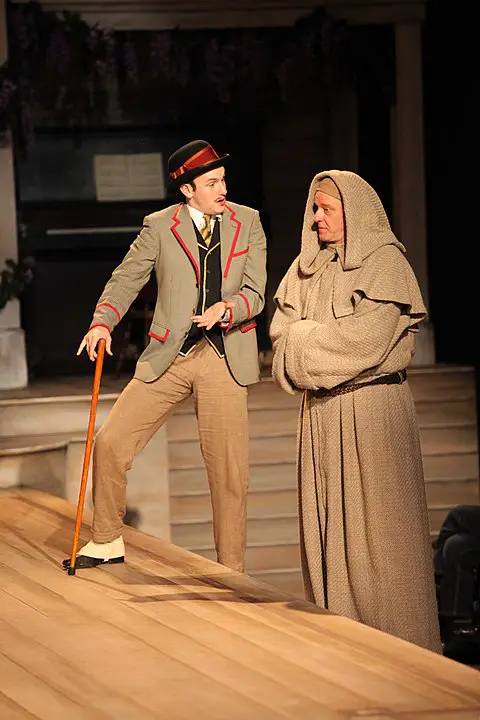
CC BY 2.0 https://creativecommons.org/
licenses/by/2.0, via Wikimedia Commons
Act 2, Scene 2
Angelo
From thee, even from thy virtue!
What’s this, what’s this? Is this her fault or mine?
The tempter or the tempted, who sins most? Ha!
Not she: nor doth she tempt: but it is I
That, lying by the violet in the sun,
Do as the carrion does, not as the flower,
Corrupt with virtuous season. Can it be
That modesty may more betray our sense
Than woman’s lightness? Having waste ground enough,
Shall we desire to raze the sanctuary
And pitch our evils there? O, fie, fie, fie!
What dost thou, or what art thou, Angelo?
Dost thou desire her foully for those things
That make her good? O, let her brother live!
Thieves for their robbery have authority
When judges steal themselves. What, do I love her,
That I desire to hear her speak again,
And feast upon her eyes? What is’t I dream on?
O cunning enemy, that, to catch a saint,
With saints dost bait thy hook! Most dangerous
Is that temptation that doth goad us on
To sin in loving virtue: never could the strumpet,
With all her double vigour, art and nature,
Once stir my temper; but this virtuous maid
Subdues me quite. Even till now,
When men were fond, I smiled and wonder’d how.
18. Merry Wives Of Windsor

Act 2, Scene 2
FORD
What a damned Epicurean rascal is this! My heart is ready to crack with impatience. Who says this is improvident jealousy? my wife hath sent to him; the hour is fixed; the match is made.
Would any man have thought this? See the hell of having a false woman! My bed shall be abused, my coffers ransacked, my reputation gnawn at; and I shall not only receive this villanous wrong,
but stand under the adoption of abominable terms, and by him that does me this wrong. Terms! names! Amaimon sounds well; Lucifer, well; Barbason, well; yet they are devils’ additions, the names of fiends: but Cuckold! Wittol!
—Cuckold! the devil himself hath not such a name. Page is an ass, a secure ass: he will trust his wife; he will not be jealous. I will rather trust a Fleming with my butter, Parson Hugh the Welshman with my cheese,
an Irishman with my aqua-vitae bottle, or a thief to walk my ambling gelding, than my wife with herself; then she plots, then she ruminates, then she devises; and what they think in their hearts they may effect, they will break their hearts but they will effect.
God be praised for my jealousy! Eleven o’clock the hour. I will prevent this, detect my wife, be revenged on Falstaff, and laugh at Page. I will about it; better three hours too soon than a minute too late. Fie, fie, fie! cuckold! cuckold! cuckold!
19. Winter’s Tale

Act 1, Scene 2
Leontes
Thou want’st a rough pash and the shoots that I have,
To be full like me: yet they say we are
Almost as like as eggs; women say so,
That will say anything but were they false
As o’er-dyed blacks, as wind, as waters, false
As dice are to be wish’d by one that fixes
No bourn ‘twixt his and mine, yet were it true
To say this boy were like me. Come, sir page,
Look on me with your welkin eye: sweet villain!
Most dear’st! my collop! Can thy dam?–may’t be?–
Affection! thy intention stabs the centre:
Thou dost make possible things not so held,
Communicatest with dreams;–how can this be?–
With what’s unreal thou coactive art,
And fellow’st nothing: then ’tis very credent
Thou mayst co-join with something; and thou dost,
And that beyond commission, and I find it,
And that to the infection of my brains
And hardening of my brows.
20. Love’s Labor’s Lost

Act 1, Scene 2
Adriano De Armado
* I will hereupon confess I am in love: and as it is
base for a soldier to love, so am I in love with a
base wench.
If drawing my sword against the humour
of affection would deliver me from the reprobate
thought of it, I would take Desire prisoner, and
ransom him to any French courtier for a new-devised
courtesy.
I think scorn to sigh: methinks I should
outswear Cupid. Comfort, me, boy: what great men
have been in love?
*I do affect the very ground, which is base, where
her shoe, which is baser, guided by her foot, which
is basest, doth tread.
I shall be forsworn, which is a great
argument of falsehood, if I love.
And how can that be true love which is falsely
attempted? Love is a familiar; Love is a devil:
there is no evil angel but Love. Yet was Samson so
tempted, and he had an excellent strength; yet was
Solomon so seduced, and he had a very good wit.
Cupid’s butt-shaft is too hard for Hercules’ club;
and therefore too much odds for a Spaniard’s rapier.
The first and second cause will not serve my turn;
the passado he respects not, the duello he regards
not:
his disgrace is to be called boy; but his
glory is to subdue men. Adieu, valour! rust rapier!
be still, drum! for your manager is in love; yea,
he loveth. Assist me, some extemporal god of rhyme,
for I am sure I shall turn sonnet.
Devise, wit; write, pen; for I
am for whole volumes in folio.
Note: This monologue is actually made up of two different monologues from Act 1, Scene 2 and both have been marked with *
Related:
15 BEST CLASSICAL COMEDY MONOLOGUES FOR WOMEN FROM PLAYS
43 Amazing Movie Monologues For Men
53 Best Dramatic Shakespeare Monologues For Men

